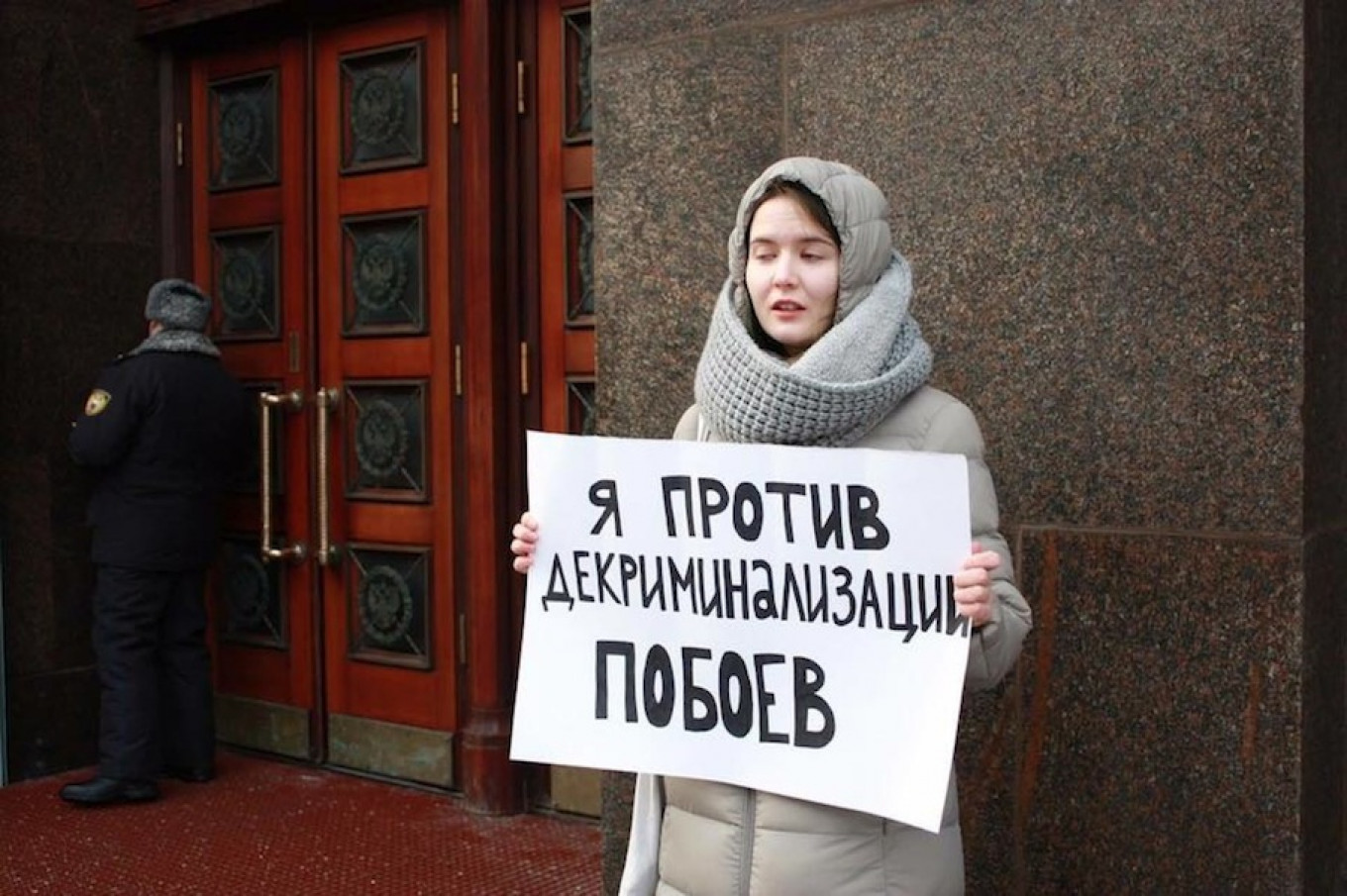You can hear these stories everywhere in Russia.
A wife gets a black eye from her husband, goes to the police, but they refuse to act on it. They say they’re not empowered to open a criminal case against the assailant who can only be prosecuted at the request of the aggrieved party.
She realizes she’d have to bring the lawsuit, collect evidence, produce witnesses and prove her case in court on her own to get the abuser convicted. Already morally destroyed by the beatings, the woman doesn’t have the strength to add this bureaucratic nightmare to the hell she already lives in. She gives up, and beatings continue, becoming her new, everyday reality.
The problem of domestic violence is rampant in Russia. According to the statistics presented last year by the Presidential Human Rights Council, 40 percent of all violent crimes occur in families. The exact number of people suffering beatings from their family members is hard to calculate, because many don’t report it, but the count has reached tens of thousands.
Last summer, activists fighting domestic violence in Russia celebrated a small, unexpected, victory. The country still had a long way to go to have a separate, long anticipated law on tackling the problem. Yet for the first time in a long while, simple battery toward “close family” that doesn’t result in bodily harm was elevated to the level of a criminal offense, punishable by two years in prison.
Their joy didn’t last long, however. Seven months later, Russia’s parliament has moved to revise this legislation and downgrade to a misdemeanor, moving the fight against domestic violence back to square one — or making the situation even worse than it was before.
Those legislative changes are dangerous in many ways, says women’s rights lawyer Mari Davtyan. “More importantly, they send a message that the state doesn’t consider familial battery fundamentally wrong anymore,” Davtyan told The Moscow Times.

The Good
It all started in July 2015 as part of the Russian Supreme Court’s liberal initiative to reduce criminal conviction rates. Back then, the Supreme Court proposed to introduce softer punishments for low-level crimes that don’t bear too much social danger, but still fall into criminal jurisdiction and land people in jail.
Simple battery — assault that doesn’t result in substantial health damage — was among the crimes proposed to be downgraded to misdemeanors if committed for the first time. Russian President Vladimir Putin supported the initiative and called on the lawmakers to back it up, too.
They did, but with a few exceptions. One of them distinguished “close family” as a social group and suggested that battery towards family members should remain a criminal offense. The amendment outlined jail time as punishment for it, alongside hooliganism-related battery and hate assault. According to lawmakers, it was aimed at protecting family members from abuse and tackling domestic violence.
Expectedly, the changes elicited outcry from the ultraconservative senator Yelena Mizulina, the firebrand of Russia’s “traditional values,” mostly known for successfully lobbying the so-called “gay propaganda law.” Mizulina claimed that nothing proves domestic violence is a problem in Russia, and the new legislation will ruin families. Her outrage didn’t change much at that point, however, and the law came into force.
The change was big. It created at least some protection for women, children and the elderly who often become subject to abuse, says Davtyan. Before, a person who beats up their family members — bad enough for them to have bruises, but not bad enough to claim sick leave, which is a different criminal offense — could only be prosecuted at the request of the aggrieved party.
“It meant that the victim must bring the lawsuit, collect evidence, find witnesses and essentially make the case herself — which is a full-time job, not to mention that it requires legal literacy,” the lawyer says.
The amendments made perpetrators of domestic violence subject to public prosecution, shifting the burden of investigating, proving and presenting the crime in court to law enforcement. Police officers, according to Davtyan, supported the change too. It empowered them to deal with crimes many of them knew about but couldn’t act .
The Bad
The backlash came from conservative parenting movements that fight against the state interfering in family matters. They accused the State Duma of prohibiting parents from parenting, by obstructing them from carrying out necessary, “non-violent” corporal punishments in the process.
“Families started suffering from this law,” Olga Avetisyan, spokesperson for the All-Russia Parents’ Resistance movement, told The Moscow Times. She mentioned several examples of “justly” punished children complaining to the police and parents becoming suspects of criminal cases resulting in family ties being destroyed.
All-Russia Parents’ Resistance picketed the State Duma building dozens of times since last summer and collected some 213,000 signatures against the legislation. Soon enough, their concerns were backed up by the Russian Orthodox Church — it released a statement saying corporal punishment carried out “lovingly” is not a bad thing. Senator Mizulina turned to lawmaking and drafted a bill decriminalizing simple battery towards “close family.”
Existing legislation makes simple battery towards a family member a criminal offense, and simple battery towards a stranger — an administrative offense, Mizulina told The Moscow Times. “For a slap, family members might face two years in prison and be labeled criminals, for slapping a stranger on the street, they face a fine of up to 40 thousand rubles.”
Her second attempt to lobby the provision was successful. Inspired by Russian President Vladimir Putin, who said during his yearly press conference that sending parents to jail for slapping their kids is an overreach, lawmakers almost unanimously supported it in the first reading. instead of a two-year jail term, under new legislation abusers would face a 30,000-ruble ($500) fine; the progressive idea of fighting domestic violence in Russia barely lasted seven months.

The Ugly
A source close to the State Duma told The Moscow Times that last year’s initiative to criminalize battery within families was considered a “blunder” from the very start, and now lawmakers are merely trying to correct it. “This amendment has put domestic battery on the same level as hate assault and hooliganism-related assaults, which are too different in terms of social danger and gravity. The whole thing turned into legal absurdity.”
It will not remain “legal absurdity” for long, however: lawmakers are in an obvious rush to correct it, says political analyst Yekaterina Schulmann. “They allocated 3 days instead of 30 to introducing amendments ahead of the second reading — which means they intend to do it really quickly,” Schulmann told The Moscow Times.
There are articles in the Criminal Code that outline punishment for inflicting bodily harm on family members — hence they will remain protected from domestic violence even after the bill passes, argues Mizulina.
Yet, it’s the bruises that domestic violence starts with, disagrees Davtyan: “Bruises easily turn into more serious bodily harm, and it’s dangerous to draw a line. Not punishing for bruises, but waiting for more serious harm.” Especially when the abuser is a family member and shares a home with the victim, the danger doesn’t go anywhere, she adds.
In addition, the bill might backfire for parents who worry about losing their parental rights for beating their children. “To take a child away from its parents, it isn’t important whether a criminal or an administrative offense took place. The only important thing is proving the fact of violence,” Davtyan explains.
Doing it in the criminal jurisdiction is a challenge, she adds: the prosecution has to collect and provide proper evidence to prove their case, the court has to act under presumption of innocence, and defenders are guaranteed a lawyer even if they can’t afford one.
“With simple battery being an administrative offense it will be much easier to prove, because administrative jurisdiction doesn’t have all these things,” Davtyan says. “So if I were these parents, I would be more concerned now than before.”






